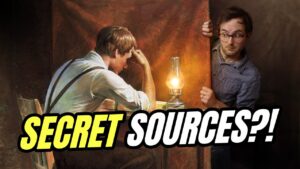Reviews
User Score
Rate This
Descriptions:
The Book of Mormon tells the story of countless wars between two nations called the Nephites and the Lamanites. Oftentimes, when the Nephites would win a battle, they would cause the Lamanites to make an oath to never return to battle against them, and then the Nephites would let them go free. Staking so much on your enemy’s word might seem odd to us today. But in this episode, Dave explains the importance of ancient oaths, and how our understanding of their importance can change how we view the Book of Mormon.
Transcript of this episode and possibly additional notes on our website: [We’ll put a link here once we’ve published it]
Many more scriptures that talk about oaths: http://bit.ly/2S5jRjw
Several more Book of Mormon examples here: http://bit.ly/2S7vMNX
McClintock and Strong Biblical Cyclopedia entry: http://bit.ly/2SroGmh
International Standard Bible Encyclopedia entry: http://bit.ly/378sG0m
From the Encyclopedia of Mormonism: http://bit.ly/39jAnlE
Comparing Vows and Oaths in Judaism (MyJewishLearning): http://bit.ly/2uu2XlB
More on this from JewishEncyclopedia: http://bit.ly/3bf0b4t
Is this segment scripted? Yes! Here’s why: https://bit.ly/2Gf3pIS
Watch more Faith and Beliefs videos: https://bit.ly/2BlOxEB
Chat with Dave on Facebook: https://bit.ly/2QQ0HKR
NOTES:
-In ancient times the severity of oaths could be heightened by the addition of curses or “an invocation of divine vengeance” (McClintock and Strong). In other words, calling upon yourself punishment if you failed to follow through with your oath, or if you were untrue. A more modern example might be, “I swear on my life I will do ‘X’.” The implication is that if you don’t follow through, you’d be willing to lose your life (that’s the curse). But anciently, these were taken much more seriously than today. This reminds me of a portion of our modern Latter-day Saint temple Endowment ceremony that was removed a few decades ago. It was known as the “Penalties,” and may have been an echo of this ancient imprecatory pattern that served to reiterate the seriousness of an oath. Just a thought.
-Notice that when Peter denies Christ 3 times in the New Testament, the severity of his denials grow progressively:
Peter denies knowing Christ (Matthew 26:70)
Peter denies knowing Christ with an oath (Matthew 26:72)
Peter denies knowing Christ with swearing (oath) and cursing (Matthew 26:74)
Typically, we think of “swearing and cursing” as simply using foul language. That’s probably not what’s going on here. Frankly, the message comes across better in the NIV version of the Bible. The irony is that it’s likely Peter made an oath in the name of Jehovah that he did not know Jesus.
SUBSCRIBE:
http://saintsunscripted/subscribe
Follow Us:
Facebook: https://www.facebook.com/SaintsUnscripted/
Instagram: https://www.instagram.com/saintsunscripted/
Twitter: https://twitter.com/SaintsUnscript
Follow the Hosts:
Kwaku: https://www.instagram.com/kwakuel/
Justin: https://www.instagram.com/motioncoaster/
Mimi: https://www.instagram.com/mimi.bascom/
David: https://www.instagram.com/davidesnell/
The Sunday Pews (by David): https://www.instagram.com/thesundaypews/










